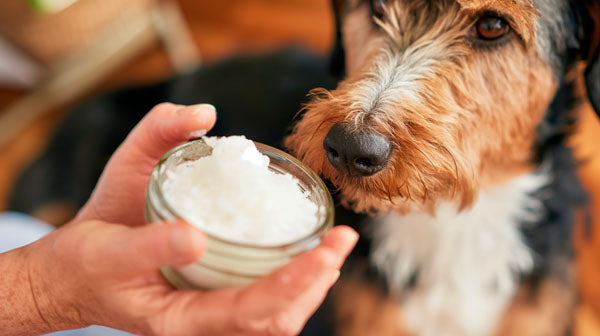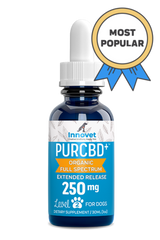Coconut oil has become a popular natural health product for humans and dogs, considered to treat everything from halitosis to dry skin to immune health to thyroid health, and even preventing cancer. So, what's the truth? Is coconut oil good for dogs? What should you know before giving it to your dog? Read on to learn more about coconut oil for dogs as well as how you might combine it with CBD oil for additional benefits.

What is Coconut Oil?
Well, coconut oil is an oil extracted from the "meat" inside mature coconuts, you know the creamy white stuff. Straight virgin coconut oil will come in a jar and look very similar to what's inside a coconut but more liquid. It is raved about for its high fatty acid content, other healthy fats, anti-bacterial properties, anti-viral properties, anti-fungal properties, triglycerides, and nutritional benefits. Science and consumer testimonies are showing great promise for coconut oil to treat a wide range of health concerns, enough that licensed veterinarians actually take it seriously as an alternate treatment option.
Benefits of Coconut Oil for Dogs
Infections
Because of its lauric acid content, coconut oil is touted as a means to prevent and treat bacterial, viral, and fungal infections. A dog with an overgrowth of Malassezia yeast or who has wounds or sores that you'd like to protect from a bacterial infection may benefit from the slathering of coconut oil. Scientists have proven that coconut oil can indeed kill bacteria, viruses, and fungus in lab tests, in fact, scientists are recommending coconut oil as a way to combat drug-resistant candida. But it hasn't been tried and proven like traditional methods, so it may or may not always protect or treat infections, so discuss potential risks with your doctor and be ready and prepared to go to more aggressive means should coconut oil not cut it.
Immunity
Ingesting coconut oil can also help boost the immune system because of medium-chain triglycerides, antioxidants, and lauric acid. This is great for dogs with weakened immune systems, chronic stress, or any dog who just needs a boost. Coconut oil might prevent disease and shorten the life of already developed diseases.
For the average dog’s immunity, many find Wild Alaskan Salmon Oil is preferable to coconut oil due to its rich content of omega-3 EPA and DHA along with it being a good source of vitamin D and antioxidants.
Energy
Medium-chain triglycerides also provide a bit of subtle, healthy energy. If your dog is feeling under the weather, suffering a lack of energy as a medication side effect, or is simply slowing down from age, they may benefit from coconut oil. This won't be like a doggy energy drink that will be unhealthy or cause a crash.
Weight Management
Because of coconut oil's boost of energy, its impact on the thyroid, and the healthy way it metabolizes in the body, it can be used as a way to manage obesity in dogs. It's also filling, making dogs feel less hungry. Depending on your dog's reason for obesity, coconut oil may or may not be answer. If your dog is severely overweight or does not quickly respond to coconut oil, you should consult your vet for more personalized advice. Coconut oil is very high in calories and needs to be limited when given to overweight dogs, especially, if they are not responding to its satiating effects.
Brain Health
There is also significant evidence that medium-chain triglycerides improve brain health and can help prevent and manage dementia in dogs.
Dogs with epilepsy may find relief in coconut oil because it boosts ketones, and ketones have been scientifically proven to lessen and prevent seizures.
Digestion
Try coconut oil if your dog is suffering from digestive issues, because it improves digestion, helps the body absorb nutrients, kills harmful bacteria in the stomach, fights inflammation in the digestive system, and soothes the digestive system. Just don't overdo it, because then they might get greasy or loose stools. If coconut oil isn’t helping with digestion issues or you're looking to give your dog’s digestion even greater support, consider a probiotic supplement that includes a blend of prebiotics.
Parasites
Coconut oil can help eliminate parasites from the dog's digestive system and skin as well. So, if your dog has tapeworms, fleas, lice, or any other parasite, coconut oil may be the answer. Lauric acid kills many parasites, and even if it can't kill them, many parasites, like lice, hate oil.
People frequently like to use coconut oil for dogs ear problems because it can eliminate parasites and prevent and heal infections. It also helps remove excess wax. However, we prefer using an ear cleaner like PurOtic designed to deeply clean a dog’s ears.
Inflammation
Lauric acid is also an anti-inflammatory, bringing down and decreasing discomfort from inflammation, which helps dogs with arthritis or acute conditions involving inflammation.
Inflammation causes pain and discomfort and can actually lead to many diseases. Theories suggest that most diseases have inflammation of some kind at their source. This means it is always important to address and manage inflammation for the overall health and wellbeing of your dog.
Cough
Coconut oil is also good at alleviating dog coughs, soothing the throat and attacking the issue causing the cough by boosting the dog's immune system.
Bad Breath
Coconut oil is commonly used as a way to treat bad breath because bad breath is caused by bacteria. If tooth brushing isn't for you and your doggie, coconut oil dental treats or a coconut oil snack may be just the ticket. If you’re looking to avoid the extra calories that can come with these items or looking for greater dental care, consider PurBreath, a no-brush oral care gel that brightens by removing plaque and tartar while freshening up bad breath

Skin
Coconut oil is also beneficial for irritated and dry skin allergies and conditions. The high-fat content of coconut oil soothes and moisturizes the skin. But using coconut oil for dog dry skin doesn't just moisturize, it also tackles other problems that cause or go with skin conditions such as yeasts, inflammation, and a weak immune system. It works for lesions from flea allergies, eczema, insect bites and stings, pressure sores, and more. The antioxidants and collagen in coconut oil speed up wound healing, improving recovery time so dogs have less risk of infection.
Regardless, make sure you are using a pet shampoo formulated to their unique skin and coat needs vs. ours. Like coconut oil, it can help moisturize their skin while stimulating a healthy coat
Allergies
You might choose coconut oil for dogs with allergies because coconut oil can boost the immune system, reduce itching, soothe skin, heal sores and wounds that have developed from complications from allergies, increase energy, and improve digestive functions. Whether the dog has an allergy from pollen, dust mites, or food, coconut oil will likely provide relief for its symptoms.
Pet parents will still need to diagnose the allergen so it can be removed. It seems like more and more pet parents are complaining their pets’ food is causing allergic reactions. This is one of the reasons more are switching to creating homemade diets that make it very easy to avoid food allergies.
And More
There are also some claims that coconut oil could prevent cancer because of its boost to the immune system and can prevent and manage diabetes because of its impact on obesity.
Using Coconut Oil for Dogs
Coconut oil may make a good replacement or supplemental treatment. Traditional medications can have terrible side effects that make the dog miserable and may even be life-threatening.
There are two primary ways to use coconut oil. Depending on the ailment you want to address, you might give it orally or topically.

Coconut oil for dogs can be bought in:
- a jar of just virgin coconut oil
- shampoo
- dental treats
- anytime treats
- ear cleaners
- wrinkle wipes
- and more
Can dogs eat it?
Do be aware that coconut oil products may or may not be edible. Depending on their intended use, they may be processed in a way that is not safe for consumption or are combined with inedible ingredients, so do not assume that any coconut oil is automatically edible just because the oil itself is.
Coconut oil is quite high in fat, and frequent consumption of too large of dosages can lead to undesired weight gain that supersedes many of its potential benefits. Obesity in dogs is associated with cancer, heart disease, osteoarthritis, and a number of other health problems.
Dosing Coconut Oil for Dogs
Follow directions on the product packaging for amounts of coconut oil to give your dog and how frequently to use it. The amount they end up needing may vary, particularly for oral applications, so don't be surprised if you have to tweak the dose to find what works best for your pet.
If you're going the straight coconut oil route, give the dog 1 teaspoon per 10 lbs of doggie orally. This will probably be about 1/4 teaspoon for small dogs and puppies. Or apply it to their bodies where needed, let sit for five minutes, and then bathe them.
It is wise to consult a licensed veterinarian for exact dosing. They may also need to know you are giving the dog coconut oil when prescribing medications for them.
Be aware that too much coconut oil can cause loose stools, greasy stools, or diarrhea.
Before Buying or Using Coconut Oil
Use caution when giving coconut oil to dogs with pancreatitis or issues metabolizing fat.
Do not apply human coconut oil products on your dog unless you are sure it doesn't have any ingredients in it that would bother them. If all the ingredients are safe, then it's fine to use coconut oil products intended for human use, though dosages would need to be changed, if there are dosages.
There is no reason why you can't just buy a jar of coconut oil from the baking section of your grocery store to feed or use on your dog unless it has something else added to it. And it shouldn't. Avoid those on general principles.
Things to Know When Purchasing Coconut Oil for Dogs
If you intend to feed your dog coconut oil, ensure you are buying a coconut oil that is edible.
Only buy unrefined, or virgin, coconut oil, or products made with it. If you are buying a jar of it alone, it should be white and creamy.
Also, make sure you choose cold-pressed coconut oil as it retains more of its soothing and nutritious qualities this way. Prioritize products made with coconut oil that say the coconut oil they used was extracted using the cold-pressed method.
Follow storage instructions. Pure coconut oil can change consistency in different temperatures, and this is okay as long as it hasn't gone rancid. If it becomes rancid, it will have a disagreeable texture and smell off.
Coconut Oil combined with CBD Oil
Coconut oil and CBD or cannabidiol oil have similar and complementary properties. However, it’s important to note, that due to CBD oil’s ability to support a regulatory system that is designed solely to support other systems like the immune and nervous systems, that most report, CBD is substantially more impactful on their pets’ health.
CBD oil is extracted from the hemp plant to give all the health benefits people associate with marijuana without the THC. THC is the chemical that causes marijuana's characteristic high and impacts cannabidiol's ability to provide long-term health benefits. To put it simply, the THC and cannabidiol mixture found in marijuana does provide health benefits, but they give you powerful effects that wear off too quickly and can leave the user with a crash. There's that high too. And the fact that it's not legal in most states.

Cannabidiol is legal everywhere in the US, doesn't cause a crash, and doesn't so much hit your dog's body with unnatural effects associated with marijuana as CBD is non-intoxicating. CBD is closer to an over-the-counter pain medication that dulls issues, whereas THC is more of a prescription medication that covers over issues with intoxicating effects.
Cannabidiol helps people and dogs:
- manage pain
- decrease inflammation
- alleviate stress and anxiety
- prevent and lessen the severity of seizures
- increase mood
- go to sleep
- maintain a healthy sleep schedule
- get a subtle energy boost
- boost their immune system
- gain nutrients
- improve digestive functions
- treat nausea
- improve appetite for the better whether it has been too little or too much
- heal skin conditions
- treat ADHD
- improve brain health and potentially repair brain damage
- treating psychosis
- fighting cancer
- and more
You may have noticed that a lot of the things on this list are things that coconut oil treats. Because they share so many common benefits and do things the other can't do, they make a great pairing. However, it’s important to note, how they set out to achieve these benefits and the degree they help can be quite significant in CBD’s favor
Many manufacturers of CBD oil use coconut oil as the medium to deliver their CBD oil. Unless you buy CBD oil extract concentrate, the CBD will be mixed with a carrier oil to aid its use. The same goes for CBD placed in capsules, made into treats, etc. Coconut oil is good choice for delivering CBD oil because they boost each other's benefits.
You might look for products containing both coconut oil and CBD oil or use a coconut oil and a CBD oil product to meet your pet's needs. But wait, there may be an even better oil to pair CBD with than coconut oil! Meet hemp seed oil.
Hemp Seed Oil Vs. Coconut Oil
Once very popular, in recent years the craze over coconut oil has slowed down. And one of those big reasons is the surge in hemp seed oils that offer a much more preferable nutrient profile. This is why you’ll see that hemp seed oil (or just hemp oil) is a core component of our CBD oils vs. MCT oils like coconut oil. This makes our CBD oil a pure hemp product. Which we feel is more natural and less demanding on the environment. Then, it amplifies what CBD oil can all do for us and our pets.
Where hemp seed oil is derived from cold-pressing hemp seeds, CBD oil is extracted from the resin that costs hemp flowers, stalks, and leaves.
Omega-3 to 6 Ratio: Hemp seeds are rich in essential omega fatty acids and typically contain a ratio of omega-3 to omega-6 in the range of 1:3 to 1:4. Experts agree this is an ideal ratio that allows omega-3 and 6s to offer their best. An ideal ratio is beneficial for promoting a healthy inflammatory response, supporting cardiovascular health, and maintaining overall well-being. Coconut oil is a poor source of both omega-3s and omega-6s.
Good Fat: Coconut oil is rich in saturated fat, which has been linked in studies to causing heart and cholesterol issues. On the other hand, hemp seed oil is rich in polyunsaturated fatty acids, which have been linked in studies to have beneficial effects against cardiovascular diseases, cancer, and inflammatory conditions.
Buying CBD oil or Coconut Oil and CBD products
Any product containing CBD will require certain considerations.
Check to ensure the product:
- contains no THC
- is third-party lab tested to ensure it is CBD oil, in the amount you're purchasing
- was extracted using the CO2 extraction method
- contains no unnecessary, synthetic, or unsafe ingredients
- was sourced from a country with responsible growing and harvesting laws
It's also important to know the difference between full-spectrum CBD oil and CBD isolate so you can select products wisely. CBD isolate is just cannabidiol, while full-spectrum CBD retains other cannabinoids and many important nutrients and terpenes that provide extra benefits. Both are great, for different people and different ailments. Most people choose full-spectrum for their pets. This is a particularly good choice if your pet needs additional nutrition. Should full-spectrum let you down, you should try a CBD isolate product before giving up on it.
Like coconut oil, CBD oil is safe, natural, and has virtually no side effects. If you give your dog too much CBD oil, they may become sedated, have diarrhea, or experience changes in appetite. A good way to discourage these side effects is by slowly introducing your dog to CBD with mild dosages. If your dog is on prescription medication, you may want to reach out to your dog’s vet to discuss CBD’s potential to interact with said medication within the CYP enzyme system
Dosing for CBD oil works similarly to coconut oil, finding the exact amount will probably take some time. How much CBD your dog will need is based on their health condition, weight, and other factors. Starting with their weight and the suggested dose on the label for said weight is the easiest way to start them on their CBD regimen. We recommend starting with the lowest recommended dose and slowly working your dog up to the average recommended dosage over 2-4 weeks.
To help with dosing CBD, we have a very handy CBD calculator. Simply put in your pet’s species and their weight. Next, pick between three dosage strengths: minimum, average, and strong. The calculator will tell you how many drops per day you should give based on the chosen dosage strength, how long the CBD item will last, and the cost per day.
Innovet’s Dosage Calculator is a great tool for when you’re not sure which concentration of CBD, or which CBD product is best for your pet, as CBD items come in a large range of concentrations to account for the difference in body weight. For example, a CBD oil designed for a small 10 lb cat isn’t going to last even a day if you plan to give it to a big 1000 lb horse.
Important Take-aways About Coconut Oil for Dogs
Coconut oil is a safe and natural way to help dogs with hard-to-treat ailments without medications or to alleviate negative side effects from medications. It has virtually no side effects itself and can offer dogs relief from stomach ailments, pain, stress, inflammation, risk of infections, and more.
There aren't strict dosing guidelines. You basically start with a small amount and work up until you find what works for your doggie for their ailment. You will want to take their age, weight, and state of health into consideration when considering dosages. It is wise to speak your dog's licensed veterinarian for personal dosing advice. You will need to monitor their weight closely. The general recommendation is that 90% of your dog’s daily calories should be coming from their main food.
You can combine coconut oil with CBD oil to boost the effects of both oils and to gain additional benefits. It's sort of like a Venn diagram, there's a lot of area where they overlap, boosting each other, and then some cool spaces where one helps with ailments the other doesn't. This combination can provide powerful relief for your pet without the side effects, risks, and chance of addiction associated with common medications. If there is already a carrier oil such as hemp seed oil already included in your CBD oil, you will likely not need to add coconut oil
If you research coconut oil on the internet, you'll find lots of articles talking about how wonderful coconut oil is and then many also talking about how it's overrated. It isn't really a miracle cure-all for everything, neither is CBD oil, although when they do help a dog who has found no help anywhere else, it feels like a miracle.
Dogs may find relief from pain or skin conditions or have the energy or an appetite they haven't had in months or years. These natural substances are alternatives to try for pets who struggle with traditional treatments. They should not be blindly adhered to without advice from a veterinarian and without being watchful for the need for yet another treatment. Science recommends these substances, but they haven't been tested long enough to be guaranteed.
Innovations from Innovet
If you're excited about the possibilities of coconut oil, hempseed oil, and CBD oil and can't find a product that works for you and your dog, contact Innovet. We invent new products to help pets with hard-to-treat ailments and would love to find a solution for your dog. With our CBD items, you are always a click away from their Certificate of Analysis (COA), which ensures you the content of the product matches the label. But that is just one of the many things we do to maximize our CBD Oil’s potential to help out your pet.
Sources:
Coconut OilHealth Effects of Coconut Oil
Coconut Oil: What Do We Really Know About It So Far?
Pharmacokinetics of Cannabidiol in Dogs
Attenuation of Early Phase Inflammation by Cannabidiol















